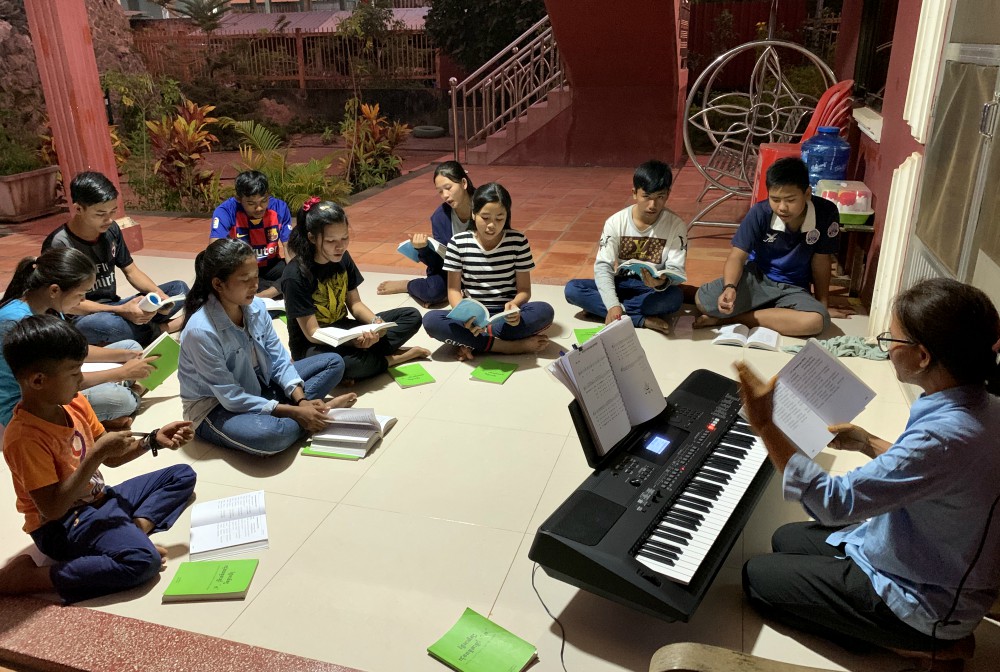
Lovers of the Holy Cross Sr. Hill Pen leads choir practice on a Saturday evening at the Catholic church in Stung Treng, Cambodia, earlier this year. (Akarath Soukhaphon)
Restrictions to prevent the spread of COVID-19 have halted the normal pastoral work of Sr. Sokny Nheb and Sr. Hill Pen in this remote area of northern Cambodia. They are now confined to a church compound, praying for the people affected by virus, those losing jobs and who cannot afford food.
Activities at the Catholic church of Stung Treng were stopped after Prime Minister Hun Sen announced on March 17 a ban on all religious gatherings throughout the country. Young people living at the youth center were sent home because the two sisters of the Lovers of the Holy Cross of Kampong Cham could not care for them due to the restrictions. The sisters now spend their time praying, making stoles, or praying with the faithful who come to visit them at a safe distance in front of the church's Marian Shrine, said Nheb, 35.
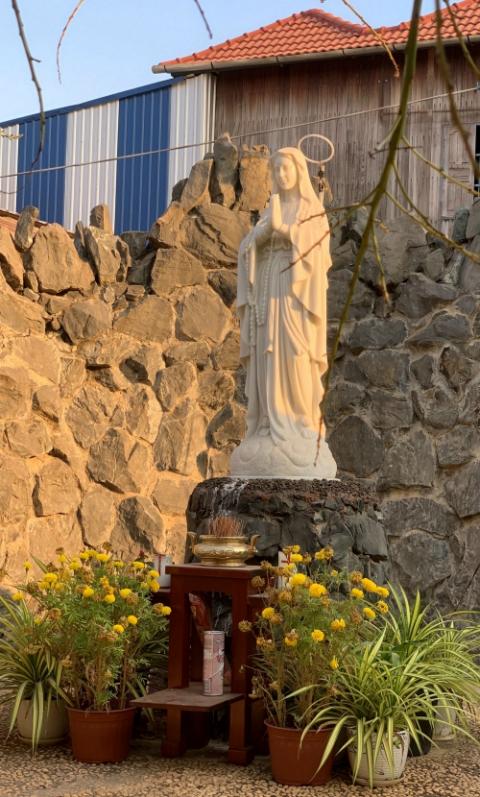
The Marian Shrine at the Catholic church of Stung Treng, Cambodia (Akarath Soukhaphon)
Besides banning religious gatherings, the government also declared a 30-day suspension of foreigners traveling into Cambodia. It shut down school nationwide, while urging people to be vigilant in maintaining social distancing and practicing personal hygiene. It also bans traveling from one province to another. In some areas, karaoke parlors, cinemas and restaurants have been closed. Garment factories have been suspended and some 60,000 workers were affected.
Local media reported April 26 that the prime minister called on the public to be more cautious in a bid to prevent the spread of coronavirus, requiring residents to stay home, wear masks when going outdoors, and wash hands with sanitizer. Many are starting to feel that the economic fallout is creating more damage than the potential health benefits of ongoing restrictions. With Cambodia yet to record a single death by the end of April and no new cases since April 12, those who have lost their jobs and business or seen a large reduction of income are now questioning the extreme health measures.
"Sometimes it is lonely," said Pen, 28. "I don't like to be alone or inactive."
Both Pen and Nheb said they miss teaching catechism, morality classes, holding singing practice, visiting, playing games, reading stories, and helping to teach basic life skills to poor village children in Stung Treng, a remote and sparsely populated northeastern province of Cambodia that borders Laos.
Less than two months ago, standing on the church steps on a Saturday, Pen greeted a group of young people as they entered the grounds on their bicycles as the sun began to set. They came for choir practice, a regular occurrence Saturday evenings at the church.
In Stung Treng, where a majority of the country's ethnic minorities reside, church workers live among their predominantly Buddhist and animist neighbors, said Fr. Iván Campaña of Ecuador, who has spent 16 years in Cambodia and is currently pastor to the churches of Stung Treng and neighboring Ratanakiri provinces.
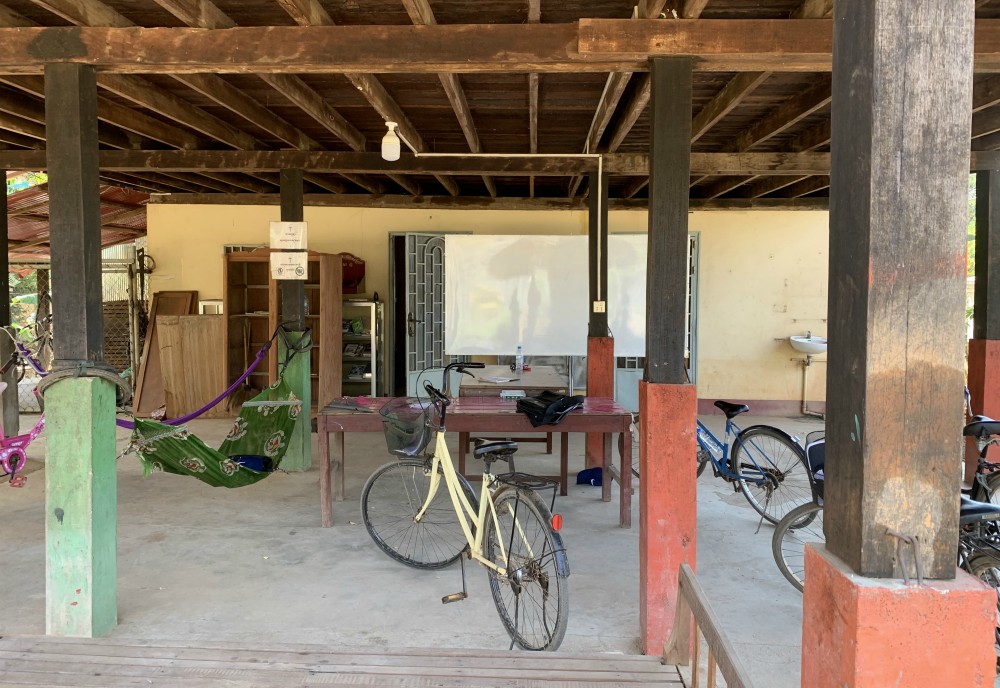
Young people staying at the Catholic youth center in Stung Treng, Cambodia, were sent home in March as the government imposed restrictions to curb the coronavirus. (Akarath Soukhaphon)
"We don't use the Bible, but rather the signs of the Bible — love, listening and visiting," he said. "We help the poor, especially the youth, to think about their future. For many children, transportation, access to safe and clean water, and absent parents are familiar problems."
Carrying on the mission of Fr. John Park, who started this youth center 10 years ago, Campaña oversees the well-being and education of the young people there. "Even if they don't become Catholic, they will have a future."
Stung Treng and Ratanakiri provinces have about 100 Catholics, 35 of whom are in Stung Treng, said Campaña, who travels between Stung Treng and Ratanakiri provinces every few days to serve Catholics. He added that Pen and Nheb came to help him a year and a half ago. The sisters have two areas of ministry: overseeing the church's daily operations and assisting the young students, ages 12-19, living at the center.
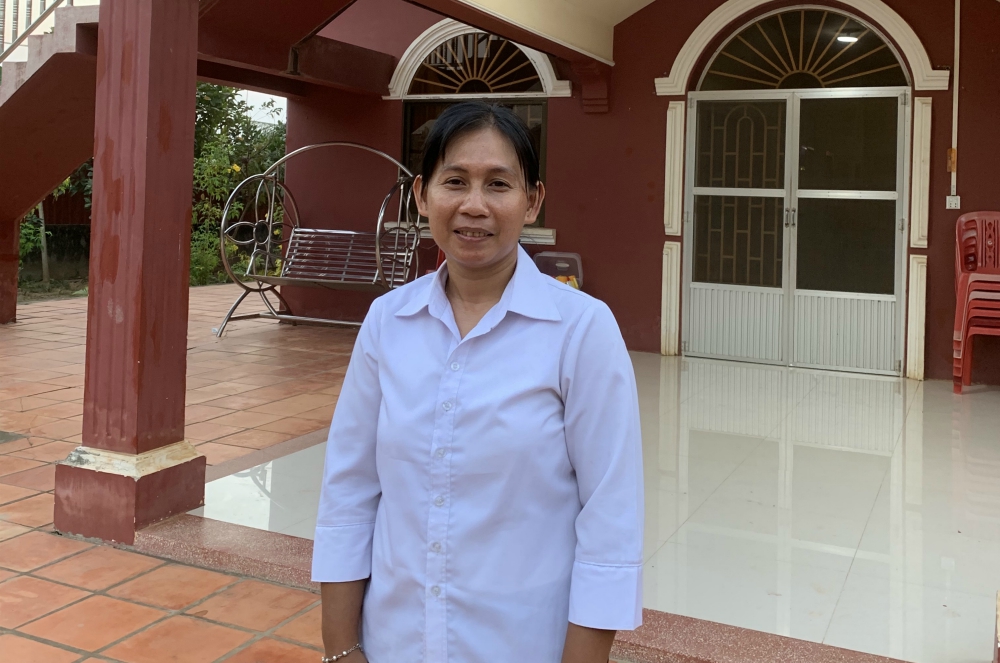
Lovers of the Holy Cross Sr. Sokny Nheb's primary ministry is teaching catechism, morality and family-value classes to young people. "I have a strong connection with them. I was very poor when I was growing up. I know what they're going through." (Akarath Soukhaphon)
Nheb, who professed her vows in 2008, has served in Kampong Cham and Kratie provinces before arriving in Stung Treng, some 300 miles north of Phnom Penh. Her primary ministry at the center is teaching catechism, morality and family-value classes to young people. "I have a strong connection with them. I was very poor when I was growing up. I know what they're going through."
Nheb acknowledges that young people have to deal with today's challenges, such as drugs or material things like mobile phones. "It's important to keep them active. We often take them on bike rides."
In total, 12 students stayed at the youth center. Located a little more than a mile from the church, the center has a dormitory, a study room and dining room. Four boys and eight girls go to local schools on weekdays, learn English with Austrian volunteers in the evening, do chores, and participate in activities with the Ecuadorian priest and the sisters.
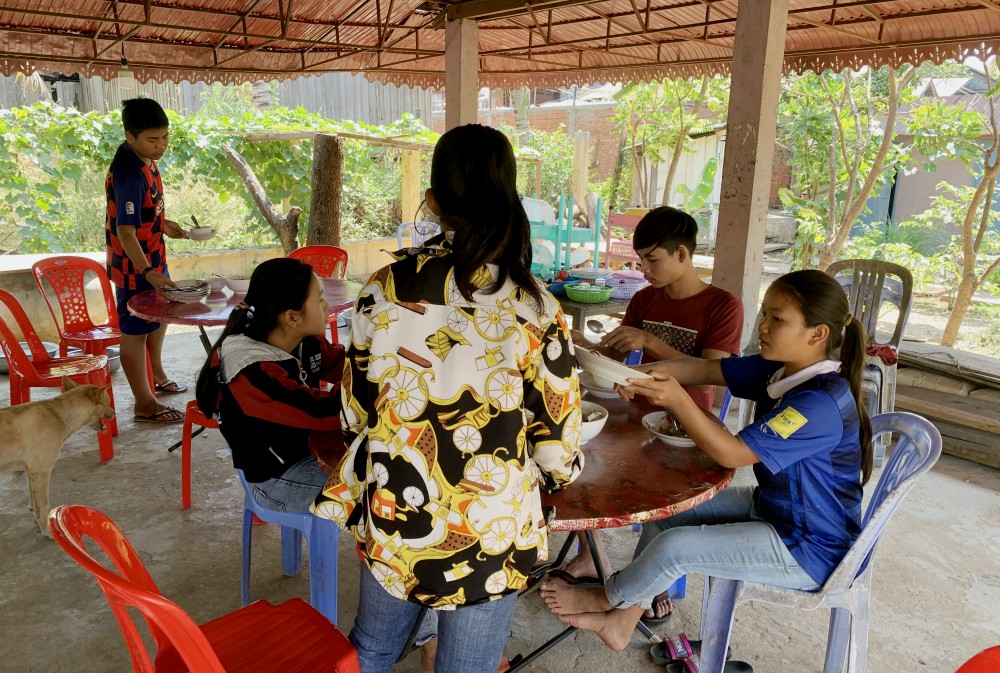
Young people finish lunch and help with chores at the Catholic youth center in Stung Treng, Cambodia. Located a little more than a mile from the church, the center has a dormitory, a study room and dining room. (Akarath Soukhaphon)
All the students come from remote villages in the province. "Sometimes the parents don't want the children to go to school. They need them to work and earn money for the family. It's a challenge to convince parents on the importance of education," Nheb said.
Most students are not Catholic, but that's never been important, said Pen, an ethnic Pnong. Pnong people are one of the indigenous groups living in the highlands of northeastern Cambodia provinces. "It's about spreading the love of Christ. I want to help people to know Jesus."
Pen also comes from humble beginnings and realizes the importance of education, especially for the poor. "When I see the poor, I see my mother. It saddens me to see people without knowledge."
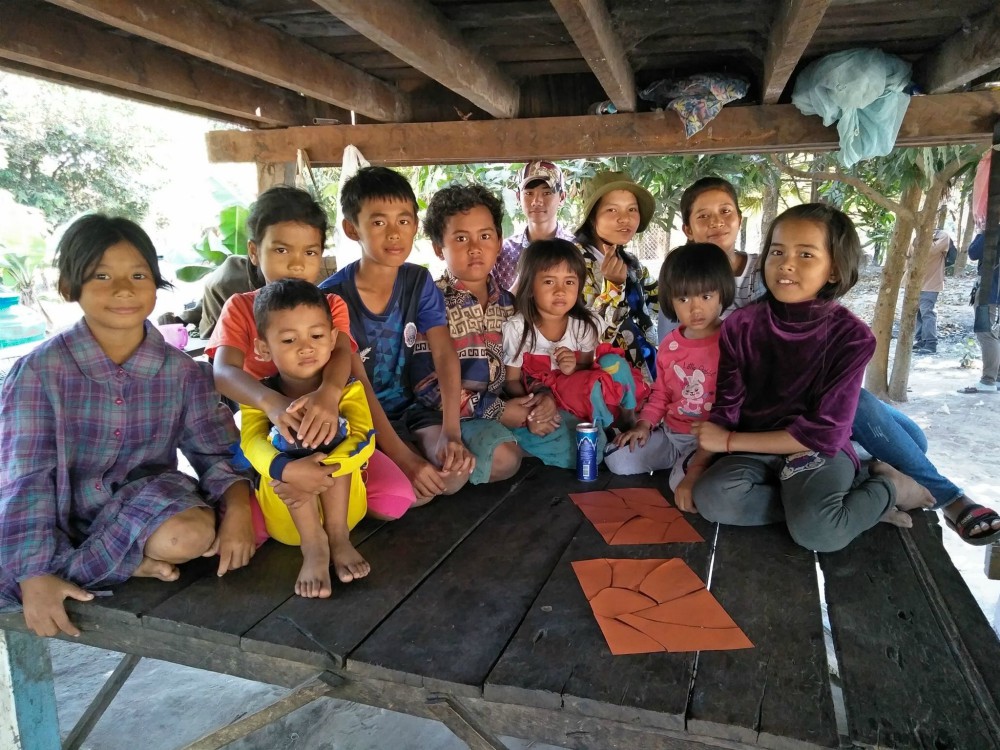
Village children during a visit from Lovers of the Holy Cross Sr. Hill Pen (Akarath Soukhaphon)
Two to three times a week, Pen and parishioners visit children in rural villages throughout the province. On Sundays, a few students from the center also join her. She spends a few hours with the village children — reading stories, singing songs and playing games. She also teaches them how to cut their nails and bathe properly. "When we go to villages, sometimes the parents are not around so we have to teach the children basic life skills."
Parents often leave adolescent children to look after younger siblings while they seek wage labor in the city or on others' farmlands, said Pen. "We go to visit with them, not as Catholic sisters but as people who just want to help."
"The sisters are so good to us. I like to sing with Sister Pen. She is good at music," remarked one student before choir practice. The weekly gathering of choir practice for Sunday's Mass is filled with laughter. Pen shares her gift of music, while Nheb inspires the young people with her teaching.
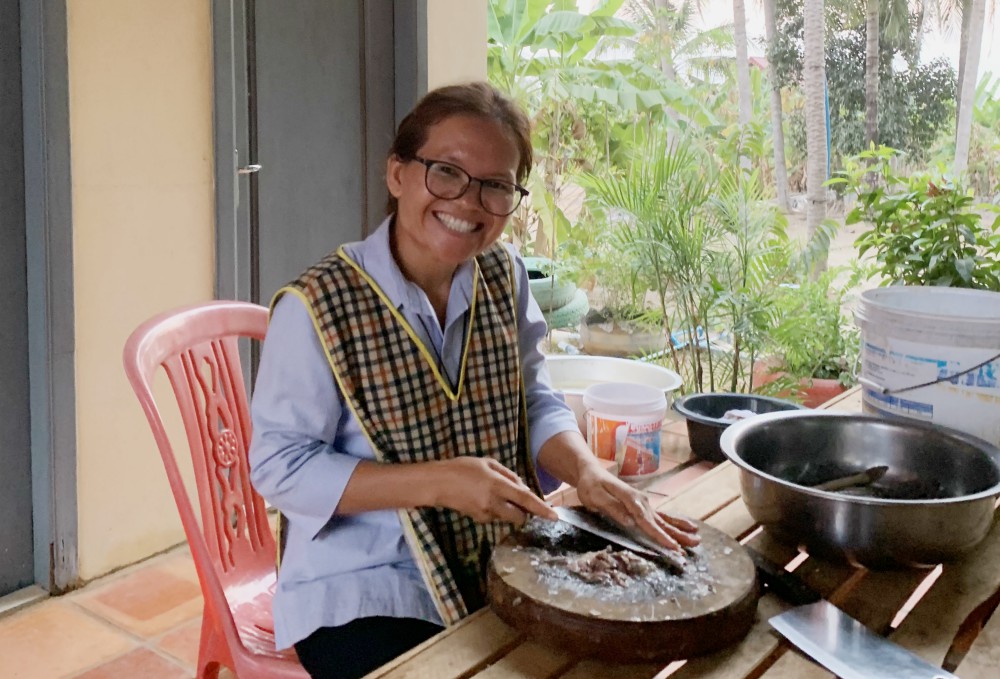
Most students are not Catholic, but that's never been important, says Lovers of the Holy Cross Sr. Hill Pen. "It's about spreading the love of Christ. I want to help people to know Jesus." (Akarath Soukhaphon)
Campaña said the sisters' influence is paying off as many young people have started to see what is possible beyond their small villages. Instead of seeing their future in the military or police force — indicative of what is perceived to be successful careers — some have expressed desires to pursue futures in education and medicine. Campaña hopes to present the young people with more alternatives.
After spending so much time with the sisters, students are comfortable asking questions about religious life, the Catholic faith, and about life and death. "We hope their curiosity and the love they get from us turns into something more. We don't try to convert them, but if they grow up to be good people, we are happy," Pen said. This is an encouraging sign for a church emerging from the shadows of the Khmer Rouge period, Pen said.
Cambodia has about 16 million people, of whom some 20,000 are Catholic, living in the Apostolic Vicariate of Phnom Penh, the Apostolic Prefecture of Battambang and the Apostolic Prefecture of Kampong Cham. In the midst of civil war in the early 1970s and following the rise to power of Lon Nol as president, tens of thousands of Vietnamese Catholics were expelled from the country, mostly to neighboring Vietnam, leaving a mere fraction of ethnic Khmer and minority believers.
Advertisement
After Pol Pot's Khmer Rouge came to power in 1975, they turned the country into a socialist agrarian republic. The Khmer Rouge emptied the cities and forced Cambodians to labor camps in the countryside. During 1975-79, mass executions, forced labor, physical abuse, malnutrition and disease were rampant.
The purge, or the Cambodian genocide, resulted in the deaths of about 1.5-2 million people. Catholics such as Bishop Joseph Chhmar Salas of Phnom Penh, Fr. Paul Tep Im Sotha, prefect of Battambang, and Fr. Jean Badré, a French Benedictine, were among the clergy, laity and religious who died. It would not be until 1989, when the new Cambodian constitution allowed for freedom of religion, that the Catholic Church slowly came back and began its work of rebuilding in Cambodia.
Nearly all Lovers of the Holy Cross sisters in Cambodia fled the country or died during the periods under Lon Nol and the Khmer Rouge. In 1996, Fr. André Lesouëf, a priest of the Paris Foreign Missions Society, started a formation house to revive the community. With help from the Lovers of the Holy Cross sisters from Ubon Ratchathani, Thailand, the Cambodian congregation has grown to the point where it can sustain itself.
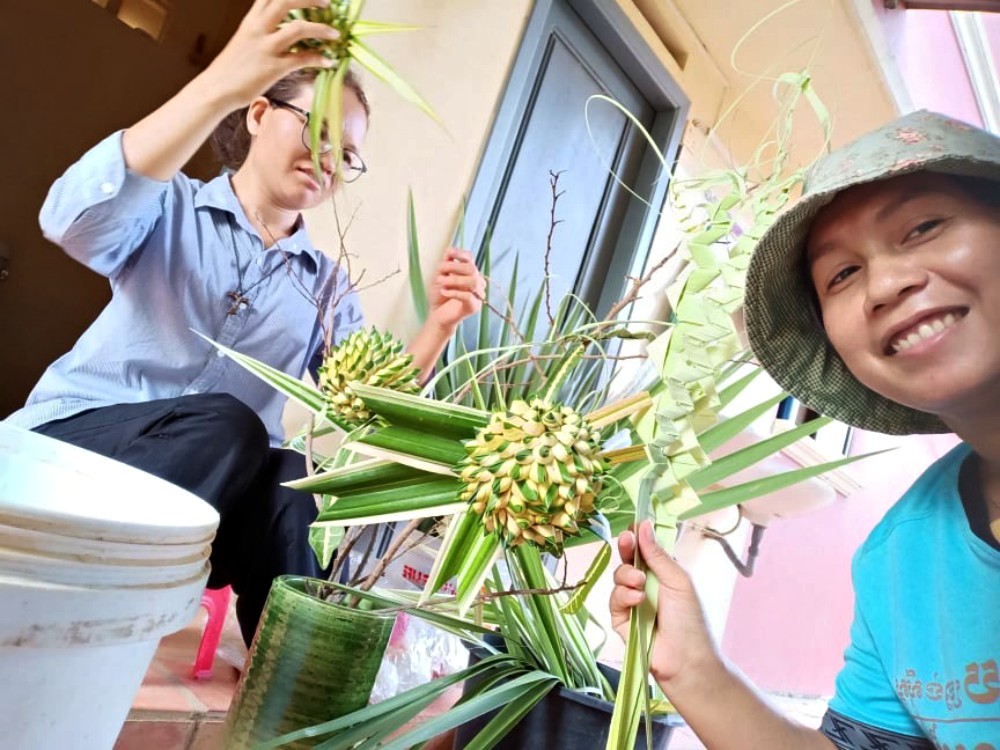
Srs. Hill Pen, left, and Sokny Nheb, right, of the Lovers of the Holy Cross prepare for Palm Sunday. (Akarath Soukhaphon)
"It was very hard then," said Sr. Marie Sevia, a Thai Lovers of the Holy Cross sister who went to Cambodia as part of a missionary society in 1992. "We were met with curiosity and reproach when visiting villagers because of our minimal Khmer language skills. Sometimes at night, we would sleep in cars on the roadside."
Those early missions laid the groundwork for the fruitful relations between the two congregations, Sevia told GSR. Though autonomous, the sisters of the Lovers of the Holy Cross of Kampong Cham still rely on their fellow sisters from Ubon Ratchathani, especially in formation training of Cambodian novices. In 2004, a delegation of Thai sisters came to Kampong Cham to celebrate the profession of two new Cambodian sisters, the first in 30 years.
Today, the Lovers of the Holy Cross of Kampong Cham has six Cambodian sisters working in Kampong Cham, Prey Veng and Stung Treng provinces. They meet for a monthly retreat, praying and sharing at the motherhouse in Kampong Cham.
The congregation traces its history to Ash Wednesday, Feb. 19, 1670 when French Bishop Pierre Marie Lambert de la Motte accepted the vows of two Vietnamese women. Today, there are 30 Lovers of the Holy Cross congregations — 24 in Vietnam, three in Thailand, one in Laos, one in Cambodia and one in the U.S. All accept de la Motte as their founder.
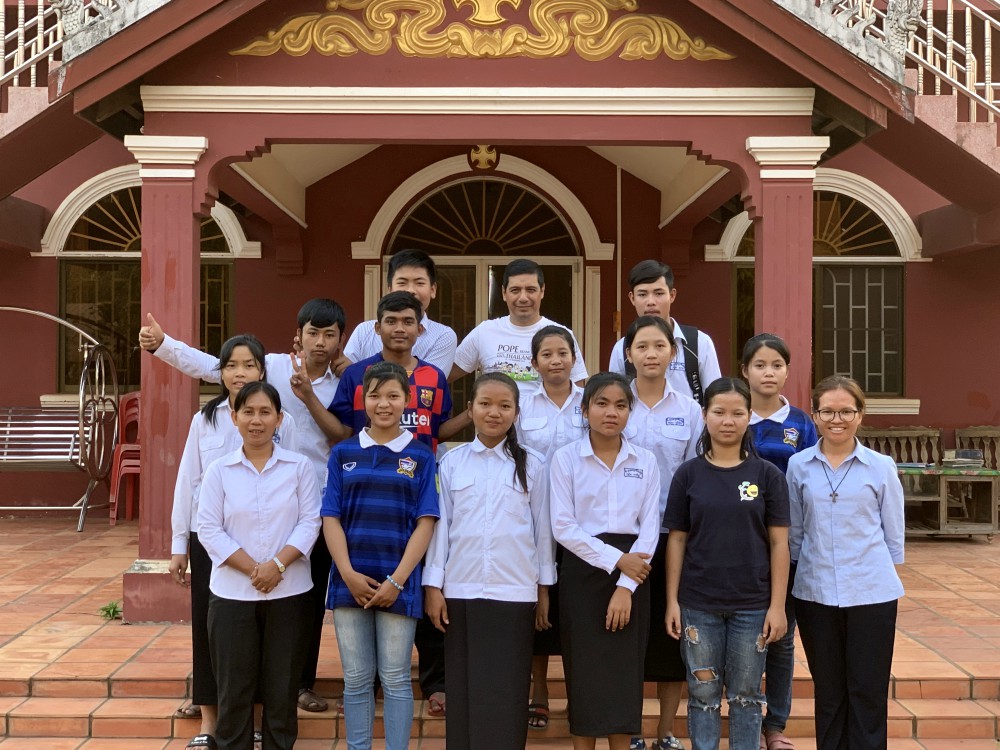
Fr. Father Ivan Campaña (center back row), Sr. Sokny Nheb (front left ) and Sr. Hill Pen (front right) with young adults in front of the church in Stung Treng, Cambodia (Akarath Soukhaphon)
Moving forward, Pen and Nheb hope the Lovers of the Holy Cross sisters become permanent fixtures in Stung Treng and beyond. Nheb said there are so many problems — ethnic and interreligious tensions, poverty and the breakdown of the family due to social and economic changes.
Despite the challenges, Campaña has seen the fruit of their work — small but not insignificant.
"We've seen our students go on to have successful careers in medicine and the finance industry," he said. "It's great to see."
Though small in number, the Lovers of the Holy Cross sisters of Kampong Cham have contributed greatly to sustaining the mission of the center and the church, he said, by offering love, compassion, and mercy to those they encounter. They continue to rebuild the fledgling Cambodian church, he said, one child, one village at a time.
[Akarath Soukhaphon is currently in Milwaukee, where he is a member of St. Michael Parish. He is a doctoral candidate in geography at the University of Wisconsin-Madison and has been conducting fieldwork research in Southeast Asia. Peter Tran is assistant director of the Redemptorist Renewal Center in Tucson, Arizona.]






